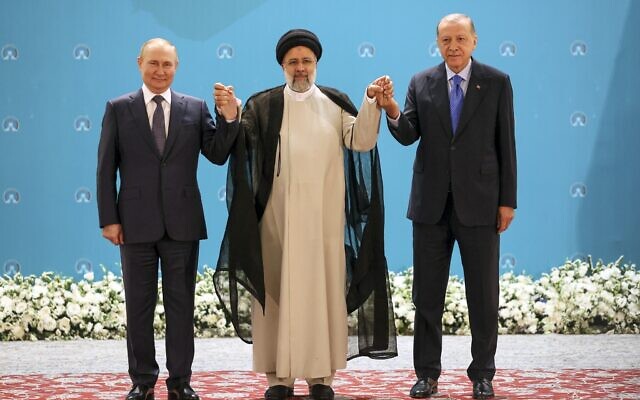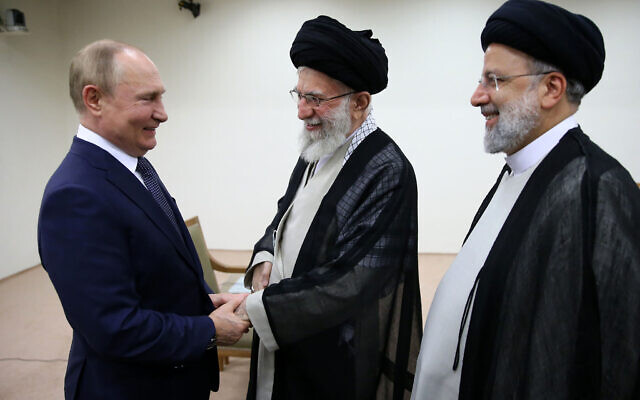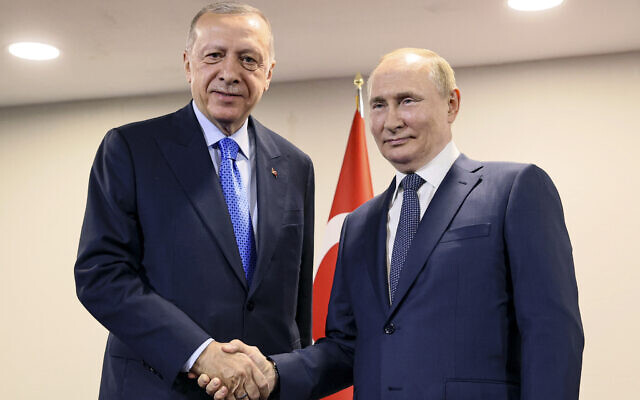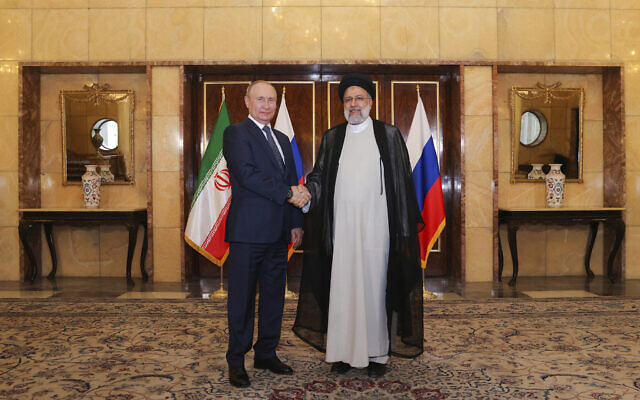In meeting with Russian leader, Iran’s Khamenei calls for strengthening ‘long-term cooperation’ with Moscow and blames West for outbreak of Ukraine war

Russian President Vladimir Putin, Iranian President Ebrahim Raisi and Turkish President Recep Tayyip Erdogan held a trilateral meeting in Tehran on Tuesday, days after US President Joe Biden wrapped up a trip to Iranian foes Israel and Saudi Arabia.
The three leaders agreed to continue consultations and cooperation to “eliminate terrorists” in Syria, in a statement following their meeting.
The three countries “reaffirmed the determination to continue their ongoing cooperation in order to ultimately eliminate terrorist individuals, groups, undertakings and entities, while ensuring the protection of the civilians and civilian infrastructure in accordance with international humanitarian law,” the statement read.
The decade-old conflict in Syria was top of the agenda for the summit, as Iran and Russia have backed Syrian President Bashar Assad’s government, while Turkey has supported armed opposition factions. Russia intervened in the conflict in 2015, pooling efforts with Iranian forces and using its air power to shore up Assad’s fledgling military.
Erdogan, speaking at the opening of the summit, urged both Russia and Iran to back its fights against “terrorism” in Syria. He had earlier told a joint news conference that Kurdish militias caused “great trouble” for both Iran and Turkey.
Putin called the summit “truly useful and rather substantial,” describing the atmosphere as “businesslike and constructive.” He also invited Raisi and Erdogan to visit Russia for a follow-up meeting “before the end of the year.”

Putin arrived in Tehran on Tuesday on only his second foreign visit since Moscow’s invasion of Ukraine in late February, which has largely isolated Russia on the global stage.
In a separate meeting with Raisi, Putin said that Iranian-Russian relations “are developing at a good pace.” The Russian leader said Moscow and Tehran will “strengthen their cooperation on international security and contribute significantly to the Syrian settlement.”
After his own sitdown with Putin, Iran’s Supreme Leader Ayatollah Ali Khamenei called for strengthening “long-term cooperation,” according to a statement.
“The long-term cooperation between Iran and Russia is deeply beneficial to both countries,” Khamenei said, according to his official website, which also noted that both countries are under Western sanctions.
“There are many understandings and contracts between the two countries, including in the oil and gas sector, which must be followed up and implemented fully,” he added.
Khamenei told Putin that although Iran “is not at all happy that ordinary people” are suffering from the Ukraine war, the West was to blame.
“If you did not take the initiative, the other side would have caused the war with its own initiative,” Khamenei said.

Putin also held a face-to-face meeting separately with Erdogan in Tehran, and thanked him for efforts to “move forward” a deal on Ukrainian grain exports.
“Not all the issues have been resolved yet, but it’s good that there has been some progress,” Putin added.
Erdogan praised what he described as Russia’s “very, very positive approach” during last week’s grain talks in Istanbul. He voiced hope a deal will be made, and “the result that will emerge will have a positive impact on the whole world.”
Putin also said there were “a lot of questions” on war-torn Syria that needed to be addressed.
He also said that the Nagorno-Karabakh crisis, which is at the center of a territorial dispute between arch foes Armenia and Azerbaijan, was another “important” issue to discuss.
As the West heaps sanctions on Russia and the costly campaign drags on, Putin is seeking to bolster ties with Tehran, a fellow target of severe US sanctions and a potential military and trade partner. In recent weeks, Russian officials visited an airfield in central Iran at least twice to review Tehran’s weapons-capable drones for possible use in Ukraine, the White House has alleged.
Iran rolled out a long red carpet for Putin at Tehran’s Mehrabad airport, where Iranian Oil Minister Javad Owji greeted him warmly before he was whisked into his presidential convoy to the city.

The gathering has symbolic meaning for Putin’s domestic audience as well, showing off Russia’s international clout even as it grows increasingly isolated and plunges deeper into confrontation with the West.
It comes just days after Biden visited Israel and Saudi Arabia — Tehran’s primary rivals. From Jerusalem and Jeddah, Biden urged Israel and Arab countries to push back on Russian, Chinese and Iranian influence that has expanded with the perception of America’s retreat from the region.
It was a tough sell. Israel maintains good relations with Putin, a necessity given Russian presence in Syria, Israel’s northeastern neighbor and frequent target of its airstrikes. Saudi Arabia and the United Arab Emirates have declined to pump more oil beyond a plan approved by their energy alliance with Moscow.
But all the countries — despite their longstanding rivalries — could agree on drawing closer to counter Iran, which has rapidly advanced its nuclear program since former US president Donald Trump abandoned Tehran’s atomic accord with world powers and reimposed crushing sanctions. Talks to restore the deal have hit a deadlock.
Backed into a corner by the West and its regional rivals, the Iranian government is ramping up uranium enrichment, cracking down on dissent and grabbing headlines with optimistic, hardline stances intended to keep the Iranian currency, the rial, from crashing. Without sanctions relief in sight, Iran’s tactical partnership with Russia has become one of survival, even as Moscow appears to be undercutting Tehran in the black market oil trade.
As reported by The Times of Israel
